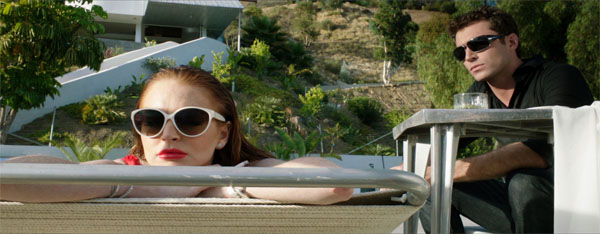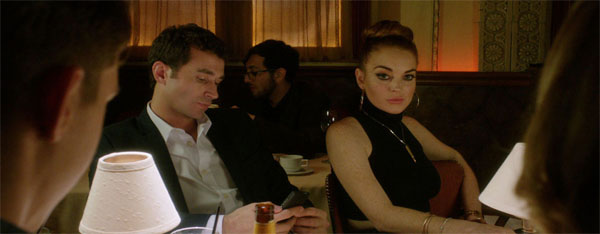“The signature psychosexual perversity of director Paul Schrader finds its nearly perfect match in novelist Bret Easton Ellis, whose screenplay for Schrader’s The Canyons might just as soon have been called ‘Psycho American Gigolo’ or ‘The Hardcore Rules of Attraction,'” begins Variety‘s Scott Foundas. “The first in the new wave of Kickstarter-funded features instigated by established old-media types, Schrader’s ultra-low-budget (reportedly $250,000) but handsomely made study of low-level Hollywood hangers-on has earned much prerelease attention for the casting of real-life porn star James Deen and the troubled Lindsay Lohan (also one of the pic’s co-producers). But the end result is hardly a joke, not least for Lohan’s fascinating presence, far closer to self-revelation than self-parody.”
Before moving on to the pans, let’s remember that Foundas is not alone. “My three favorite Schrader-directed films originate with strong source material,” writes Larry Gross, introducing his interview with the director in the current issue of Film Comment:
Affliction [1997], Mishima [1985], and now The Canyons... I saw The Canyons a couple of days after Baz Luhrmann’s The Great Gatsby and I was struck by the similarity of their plots. A poor guy vies with a rich guy for the heart of a flawed princess. The bloody dynamics of a crime story exist on the edge of the action without ever quite taking over. Everyone is seduced and corrupted and driven to one degree or another by the power of money, and ultimately no one gets what they want. Every material object or career goal eludes, mocks, or disappoints the desire it incites. I enjoyed Luhrmann’s movie, but I liked The Canyons more. Fitzgerald had one stupendous insight that has ensured his book’s relevance today: Gatsby is a “virtual” personality, a tissue of constructed impressions and wild rumor, almost born for the Internet. This virtual reality has become simply our reality. In The Canyons, Schrader and Ellis depict it as a chronically empty, zombie-like zone of blankness and frustration, and they do it with uncanny, dreadful precision.
The Hollywood Reporter‘s Todd McCarthy disagrees: “Far from the renegade, boundary-pushing, sexually explicit sensation that its makers have been suggesting, The Canyons is a lame, one-dimensional and ultimately dreary look at peripheral Hollywood types not worth anyone’s time either onscreen or in real life. Skanky side of L.A. expert Bret Easton Ellis employs nothing but melodramatic cliches in relating the manipulative and duplicitous doings of characters altogether interchangeable in their tediousness and lack of distinct personalities, while Paul Schrader had far more to work with in his last foray into scum-bucket Hollywood behavior in the excellent Auto Focus.”
The Canyons is “a fitfully intriguing but ultimately aimless psychosexual thriller,” finds John Hazelton in Screen Daily. “Ellis sets up a love triangle between arrogant trust-fund movie producer Christian (played by porn star James Deen), his emotionally and financially dependent girlfriend Tara (Lohan) and struggling actor Ryan (Glee’s Nolan Funk)…. The tone is sinister neo-noir, with cell phones playing an important role (which may—along with the VOD/theatrical release strategy—account for the occasional insert shots of abandoned cinemas).”
Indiewire‘s Eric Kohn argues that “instead of commenting on the vapidity of the film industry, Paul Schrader’s miscast, poorly executed and utterly soulless drama is an example of the failing art form it seeks to indict…. The Canyons arrives at the tail-end of a saga first publicized early this year, when a nearly 7,500-word article in the New York Times Magazine documented its troubled production, much of which involved star Lindsay Lohan’s disastrous work ethic that ranged from on-set tantrums to late-night party sessions that thew off the entire schedule. None of those details would matter if The Canyons weren’t itself such a self-conscious trainwreck filled with provocative ideas poorly executed.”
Back in Film Comment, Schrader himself responds to that NYT Magazine piece, arguing that working with Lohan was worth the trouble.
Chris Wallace profiles Ellis for the NYT: “‘As someone who loved American movies,’ he tweeted this month, ‘at some point in 2013 I realized that they were probably dead as an art form. I am late to the game.’ This guarded irreverence, declaring the collapse of the status quo, runs through each of the adaptations of Mr. Ellis’s books, Less Than Zero, American Psycho, The Rules of Attraction, and The Informers—a series of films that, though they have different screenwriters and directors, form a genre unto themselves…. Following closely the trajectory of his own life, from the prestigious Buckley school in Los Angeles to Bennington College in Vermont, and then to New York, where he found fame among the literary Brat Pack, Mr. Ellis’s canon is a procession of the beautiful and the damned of his generation from one sadistic bacchanalia to another.”
Reed Tucker profiles Deen for the New York Post.
Update: Matt Patches talks with Schrader for Film.com, where he also writes that The Canyons “has all the elegance and depth of a daytime soap opera, peppered with flashes of name brand nudity for a tantalizing hook. It’s a slog.”
Updates, 7/31: “Like De Palma, Schrader is a filmmaker whose aesthetic predilections rarely align with modern conceptions of good taste, which is why approaching the work of either director seeking things like naturalism and dramatic realism can lead only to bafflement and disappointment,” writes Calum Marsh at Film.com:
And yet many credible, thoughtful critics have for some reason taken to dismissing the film on grounds it has clearly chosen for itself, simply pointing out its most deliberate qualities as if they were inherently flaws, impossible to configure as virtues….
The best review of The Canyons is also the one published earliest. Phil Coldiron, writing in the most recent issue of Cinema Scope, observes that “The Canyons is a film without psychology, even interiority, one where an individual is defined exclusively by whom they’ve fucked and whom they’re fucking.” How much mileage this concern has for you will vary, of course, but the important thing is that the film not be dismissed merely because of what it chooses to lack. The absence of psychology is not a fault so much as a principle. Same goes for its artificiality: the film is constructed from artifice because artifice is the nature of its world. In that way it would make a good double bill with David Cronenberg’s Cosmopolis, also dismissed upon release for what were perceived to be its “fakeness” and its failures in constructing a naturalistic world…. Or, for that matter, De Palma’s Passion, which comes out at the end of the month and will inevitably be misunderstood. That is a film which embraces the conventions of the erotic thriller self-consciously, and in so doing brushes up against the limits of taste—elements of it are silly, stylized, and exaggerated fondly. It is easy to identify those elements as necessarily “bad”. It is also wrong.
“The ultimate problem,” finds Chuck Bowen at Slant, “is that Schrader and Ellis’s sensibilities merge seamlessly. The filmmaker and the author are both talented (particularly Schrader, a great film critic who’s also written two or three of the greatest American screenplays), but they have similarly conflicting urges to get off on privileged moral decay while simultaneously scolding the audience for similarly getting off. Their films and novels, respectively, are often over-intellectualized and phony, and neither has the instinct for allure and sensuality necessary to imbue their violent erotica with heat and nuance, much less ambiguity.”
“A movie can be highly imperfect, stilted, or implausible in all sorts of ways—and still be everything you go to the movies for,” writes Stephanie Zacharek in the Voice, and The Canyons “is that kind of picture, in some places so crazy-silly you want to laugh and in others so piercing you can’t turn away.”
“The Canyons is being closely watched by pundits, media, filmmakers and low-budget studios to see if its low-risk economics can sustain post-theatrical cinema,” Rodrigo Perez reminds us at the Playlist. “That’s fine and all, but what easily threatens to overshadow that conversation is the poor quality of The Canyons, the forgettable movie itself and the lousy, lost soul characters you could really give a damn about.”
At the Dissolve, Matt Singer‘s got notes from Schrader’s recent appearance at the Film Society of Lincoln Center. Turns out, what Schrader’d like to do is write a movie about Clarence Thomas and see Spike Lee direct it. Meantime, as Kevin Jagernauth reports at the Playlist, it seems that Paul Schrader will be directing Nicolas Cage in The Dying of the Light.
More interviews with Schrader: Emma Brown (Interview), Hillary Weston (BlackBook), and Zachary Wigon (Tribeca).
Updates, 8/1: “There’s something brazen, maybe even admirable, about Schrader’s mismatched camera setups, or the way he uses wide-angle lenses to cram as much empty space into the frame as possible,” writes Ignatiy Vishnevetsky at the AV Club. “Schrader made his name with feverish portraits of self-loathing and self-destruction—his screenplays for Taxi Driver and Raging Bull, his fractured biopic Mishima: A Life In Four Chapters—but here he adopts a tone so cold that it is becomes deliberately off-putting.”
It is indeed “a cold, sad story that depicts the next generation of moviemakers as spoiled, vapid narcissists,” agrees Matt Singer at the Dissolve. “The movie seems to despise itself.”
R. Kurt Osenlund talks with Schrader for Slant.
Updates, 8/2: For the NYT‘s Manohla Dargis, The Canyons “is a dispiriting, unpleasurable work punctuated with flashes of vitalizing vulgarity. It isn’t a good movie in terms of the conventional norms (acting for starters), but it also exhibits a crude integrity. If you take the characters seriously or at their word, a mistake for such a dissembling, venal group, you may think that this is just another story about the dirty business of making movies. Hollywood types have been rolling around in the muck about as long as there’s been an industry (that’s what made Sammy run); the twist here is that no one here seems to care anymore.”
The New Yorker‘s Richard Brody argues that “Schrader and Ellis have darkly fascinating things to say about the connections between sex, money, and power—and about their ineluctable connection to the world of movies.”
“An ice bath in depraved alienation that revolves around the making of a no-budget shocker, The Canyons is a down-and-dirty B-movie, visually witty and texturally overwhelming, and it’s exciting and emotionally brutal in a way that American movies typically aren’t,” writes Jason Shawhan in the Nashville Scene.
“It was brave of Lohan to expose herself the way she does in The Canyons,” writes Salon‘s Andrew O’Hehir. A “director can shoot around bad behavior, but not around a lack of charisma—and whether you view what she does in this movie as great acting or a public meltdown, it’s riveting.”
“She can indeed be a raw nerve on screen,” agrees Christy Lemire at RogerEbert.com, “but too she often seems distant and rushed, to the point where her lines are unintelligible (but that could just be the shoddy sound mix). Instead of leaving you inspired by the possibility of renewal, Lohan’s performance just leaves you feeling sad. Maybe playing a troubled young woman wasn’t the best way for her to escape being a troubled young woman.”
The Playlist‘s Kevin Jagernauth interviews Schrader, while Vulture‘s Kyle Buchanan talks with Deen.
New York‘s David Edelstein: “The Canyons isn’t just bad, it’s rank—and it takes a peculiar sort of integrity to denude the frame of life to the point where it smells to heaven. The author of a brilliant study of Ozu, Bresson, and Dreyer called Transcendental Style in Film, Schrader has perfected a style that is miserably un-transcendent.”
Kent Jones interviews Schrader
Updates, 8/8: “Schrader already made his Cat People; this is his I Walked with a Zombie.” Nick Pinkerton in Reverse Shot: “It’s true the movie is cold; true it’s populated with self-serving dolts. So why, here, is it suddenly so heartbreaking?”
“The Canyons isn’t exactly bad,” finds Dennis Harvey in the Bay Guardian. “Instead, it’s a middling exercise in upscale erotic-thrillerdom, beautifully crafted (on a Kickstarter dime), clever yet superficial in terms of psychological depth.”
“Another one of those films that’s far more interesting to think and talk about than it is to actually sit through,” finds the Philadelphia Weekly‘s Sean Burns.
Updates, 8/9: The Canyons “might be a seedy, B-grade noir on the surface,” writes Glenn Heath Jr. in the San Diego City Beat, “but it suggests an interesting double betrayal perpetrated between Hollywood and its audience. The actions of the characters in Schrader’s film represent this growing tension. Not only does Hollywood resent the masses for finding a new form of entertainment in their own self-fulfilling fantasies, audiences in turn have abdicated experiencing film-going in the traditional way. In short, the joy of experiencing film art in a collective setting has turned toxic. All that’s left is perpetual menace, in high definition.”
“No one here risks enough to achieve disaster,” finds Wesley Morris at Grantland. “It’s worse than that. It believes it’s taking risks it actually has no interest in taking, that it’s seeing profundity in the showbiz shallows.”
Update, 8/19: In the Los Angeles Review of Books, Naomi Fry focuses on “The Canyons’ highlighting of the anti-spectacular as a model for what capitalism in America feels like right now. In fact, I’d argue that The Canyons is an important movie because it identifies how desperately many of us still want to believe that the larger-than-life, commodified good life is still available to us, and how much we yearn to repress whatever and whoever punctures this hope.”
For news and tips throughout the day every day, follow @KeyframeDaily on Twitter and/or the RSS feed. Get Keyframe Daily in your inbox by signing in at fandor.com/daily.






